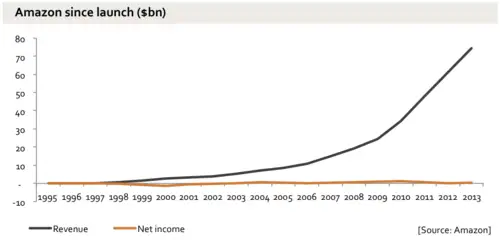Amazon is often portrayed in the media as an unstoppable behemoth indiscriminately crushing everything from indie bookstores to big box stores on its way to world domination.
But recently more have started to question that narrative. Amazon’s July attempt at entering the smartphone market was a highly-publicized disaster, but critics are pointing to far more than just that misstep.
One area of major scrutiny is Amazon’s meager profits, which have stayed flat over the years even as the company continually grows and increases revenues.

In early December 2014, Moody’s downgraded Amazon’s outlook to “Negative” after the company announced it was issuing new debt and more investors started to question its long-term potential.
But overall, concluding that Amazon is ill-suited for long-term success because of a current lack of profitability is misguided.
For one, some of the disappointing numbers are due to the fact that Amazon is “disrupting itself,” by, for one, “intentionally cannibalizing some major product lines — offering free or nearly free music, video and e-books — to draw tens of millions of people into its ecosystem” including the Kindle.
In addition, Amazon’s publicly available revenue numbers are somewhat misleading as they do not break down in much detail the company’s increasingly diverse operations, among other reporting oddities.
Much of Amazon’s revenue is being reinvested in grandiose projects like drone delivery and a complete grocery service.
But this idea of competition has been given renewed scrutiny of late. A NYTimes piece, for example, dug deeper and profiled a few companies that might go places that Amazon can’t.
One such service is Postmates, which is a network of local couriers who can bring you goods from local stores.
Its founder expanded a bit on how their model differs from Amazon:
“We want to use the city as our warehouse instead of building a warehouse outside the city … We want to be part of a city versus saying, ‘Here’s a way that you can save $2 on an item, but nobody in your city earns a dime.”
What do you think about Amazon’s lack of profitability? Can local concerns such as this ever take a serious chunk out of Amazon after they suck more and more people into their world?




Leave a Reply